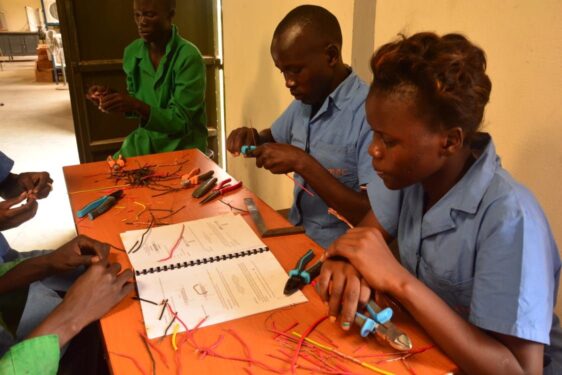
WASHINGTON — International Women’s Day, celebrated March 8 and honoring the achievements of women, is a national holiday in many countries.
Although the day grew out of efforts to promote women’s suffrage in the early 20th century, it has been sponsored by the United Nations since 1975 and has become an occasion to focus on women’s equality and rights, particularly in developing countries.
UN Women, a group dedicated to gender equality worldwide, points out that although millions of women are currently doing paid labor, the number of women in the workforce is far behind that of men, and women are more often working in the lowest paid jobs.
The Salesian Missions, headquartered in New Rochelle, New York, is aiming to do something about this.
The Catholic nonprofit group, part of the Don Bosco Network, raises funds for international programs that serve youth and families in poor communities around the globe. Salesian missionaries work in more than 130 countries and help young people, particularly young women and girls, to become self-sufficient by learning a trade that will help them gain employment.
“Salesian schools and centers focus on inclusion of girls and young women to ensure equal access to education and the support needed to graduate and find stable employment,” said Salesian Father Michael Conway, director of Salesian Missions. “These efforts with girls and young women ensure that they can achieve long-term self-sustainability while empowering them to make good life choices for themselves and their families.”
In Ecuador, Salesian missionaries with Bosco Global launched a project to provide 80 Indigenous artisan women with vocational training to improve production and sales of their products.
Training sessions have focused on the proper use of raw materials such as fibers, straw, and sheep and llama wool and on innovation in designs to make their products more marketable.
The women also learned about better packaging of their homemade jams along with a safe packaging plan that guarantees compliance with manufacturing best practices.
In the Philippines, 15 young women who are first-year students at Don Bosco College in Canlubang, have been awarded scholarships that will allow them to learn to become skilled electrical technicians. The scholarships cover tuition fees and allowances for students in the electrical training programs and also provide four-months of on-the-job training.
In Rwanda, young women in the vocational education training program at Don Bosco Gatenga, were given toolkits for employment while completing their technical courses in plumbing and electricity. This is the first group of women in the program.
Salesians involved in this work note that recent studies have shown that women are still underrepresented in technical courses such as masonry, welding, plumbing, electricity, and carpentry, and they have been trying to encourage more young women to take these classes.
At the Don Bosco Technical School in Bukavu in the eastern region of the Democratic Republic of the Congo, many of the women students do not take courses traditionally viewed as reserved for men, but some women see them as providing a viable career path.
Materials from the Salesians about this program highlights a 20-year-old graduate, Blandine, who was the only woman in her masonry course.
Blandine is the oldest of seven siblings, and although she always dreamed of studying English and becoming an interpreter, her family’s financial situation and the responsibility of taking care of her siblings prevented her from doing so. When she was told that she could learn a trade at Don Bosco Technical School, Blandine decided to become a bricklayer.
Now she has a steady job, helps her family and helps pay for her younger siblings’ schooling.
“Not all girls have to be seamstresses and not all boys have to be mechanics or welders. I was always interested in how to build walls and buildings, and since there is a lot of construction going on in Bukavu right now, I thought it would be a good future for me and that I would be good at it,” she said.
She also told the Salesians that she will always be grateful for the theoretical, practical, and religious education she received. After graduating, she has worked at five construction sites and has never lacked employment.
She encourages other young women to follow in her footsteps, saying they should “learn manual jobs that are thought to be reserved only for boys, because of course we are just as capable. This is the best way to ensure that we are not taken advantage of, that we don’t marry too young, and that our rights are clear.”
